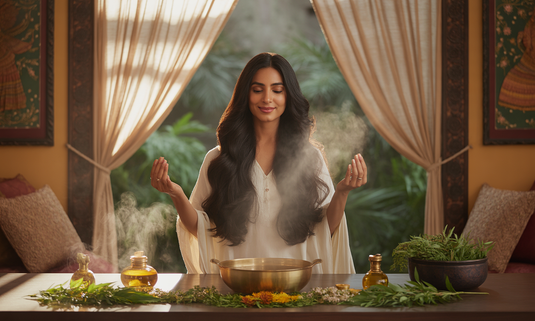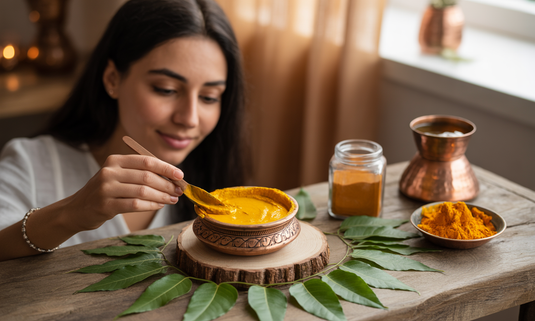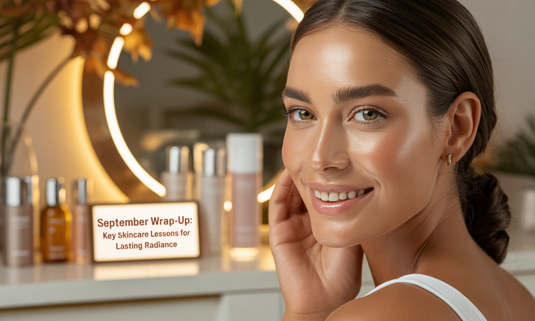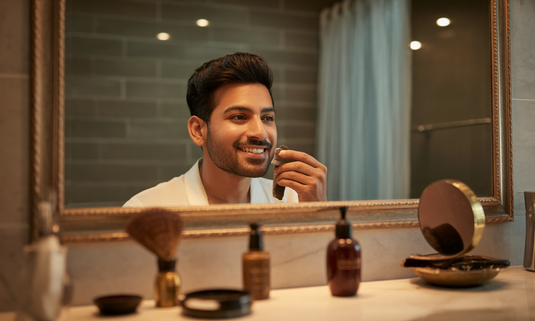
The Link Between Skin Health and Hair Fall: What You Need to Know
Have you ever noticed your hair thinning or falling out more when your skin feels irritated or inflamed? That’s not a coincidence. Your skin and hair are more connected than you may realize, and ignoring one can negatively impact the other.
If you’re struggling with persistent hair fall despite using hair serums and treatments, the real solution might start with your skin—especially the skin on your scalp. Understanding the connection between skin health and hair fall is essential for achieving both glowing skin and fuller, healthier hair.
How Skin and Hair Are Linked
Skin and hair are part of the same biological system: the integumentary system. This system includes your skin, scalp, hair, nails, and oil glands. When your skin is healthy, it creates the ideal environment for hair to grow strong and healthy.
On the other hand, skin conditions like inflammation, flakiness, or blocked pores on the scalp can disrupt hair follicle function, leading to hair thinning or excessive shedding.
Common Skin-Related Causes of Hair Fall
1. Scalp Inflammation and Irritation
Just like the skin on your face, your scalp can become irritated due to excess oil, product build-up, or underlying skin conditions such as seborrheic dermatitis or psoriasis. These issues weaken the hair follicles and trigger premature hair fall.
Solution: Use a gentle, pH-balanced shampoo and include regular scalp exfoliation in your routine to clear away dead skin and buildup.
2. Nutritional Deficiencies
Your skin and hair rely on essential nutrients to stay healthy. Deficiencies in iron, zinc, biotin, Vitamin D, and Omega-3 fatty acids can lead to both dull skin and hair fall.
Solution: Eat a balanced diet rich in leafy greens, lean proteins, whole grains, and healthy fats. Consider supplements if advised by a healthcare professional.
3. Hormonal Imbalances
Conditions such as PCOS, thyroid disorders, and menopause cause hormonal shifts that can trigger acne, dryness, or pigmentation on the skin—and hair fall on the scalp.
Solution: Consult a doctor for blood tests and hormone evaluation. A customized treatment plan can help you regain balance and restore your skin and hair health.
4. Chronic Skin Conditions
Inflammatory conditions like eczema, dermatitis, and fungal infections on the scalp can damage hair follicles and slow down hair growth.
Solution: Use anti-inflammatory ingredients like aloe vera, tea tree oil, or salicylic acid under the guidance of a dermatologist. Avoid scratching or picking at irritated skin.
5. Harsh Haircare and Skincare Products
Products that contain sulfates, parabens, or artificial fragrances may disrupt your skin’s protective barrier, causing dryness and irritation. This weakens the scalp environment and affects hair follicles.
Solution: Switch to clean, skin-safe products that nourish without stripping away natural oils. Look for formulations with natural extracts, vitamins, and gentle cleansers.
 How to Improve Skin and Hair Health Together
How to Improve Skin and Hair Health Together
✅ Use Scalp-Friendly Products
Invest in shampoos and conditioners that focus on scalp health. Look for ingredients such as:
- Salicylic acid to remove buildup
- Panthenol (Vitamin B5) to moisturize
- Niacinamide to calm inflammation
- Caffeine to stimulate blood flow and follicle strength
✅ Hydrate from the Inside Out
Drink enough water daily—at least 8 to 10 glasses—to help your body flush out toxins and keep skin cells plump and hydrated. Hydrated skin improves nutrient absorption at the scalp, which benefits hair growth.
✅ Nourish Your Scalp Before Shampooing
Applying a pre-shampoo conditioning serum helps balance the scalp’s moisture, soften buildup, and prepare your scalp to absorb nutrients more effectively. Choose serums with jojoba oil, rosemary, or argan oil for best results.
✅ Treat the Scalp as Part of Skincare
The scalp is often forgotten in skincare routines. Include it in your weekly regime with exfoliating scrubs, soothing masks, and scalp massages to encourage blood circulation and stimulate healthy hair growth.
When Should You See a Specialist?
If you're dealing with ongoing issues like hair loss or scalp discomfort, it's best to see a dermatologist or trichologist:
- Sudden or severe hair loss
- Persistent scalp itching or redness
- Bald patches or scaly skin on the scalp
- Breakouts or infections around the hairline
Early diagnosis and the right treatment plan can help avoid lasting damage and promote quicker healing.
The Glamacious Approach: A Whole-Body Wellness Solution
At Glamacious, we believe beauty begins at the root—literally. That’s why our products are thoughtfully created to support both skin and scalp health, using nature-powered ingredients and skin-loving science.
From our pre-shampoo conditioning hair serum to our vitamin-rich foaming face cleansers, every formula is crafted to restore balance, reduce inflammation, and help you achieve radiant skin and resilient hair.
Taking care of your skin isn’t just about a glowing face—it’s the first step to stronger, thicker hair. When your scalp is in good health, your follicles thrive—resulting in reduced hair fall and improved hair growth.
By aligning your skincare and haircare routines, you can treat the root cause of hair fall and enjoy visible improvements in both areas. It's time to give your skin the attention it deserves—for the sake of your hair, too.
Support your skin. Strengthen your roots. Grow with confidence.
Discover the secret to healthy skin and vibrant hair—explore the full range at www.glamacious.com.
